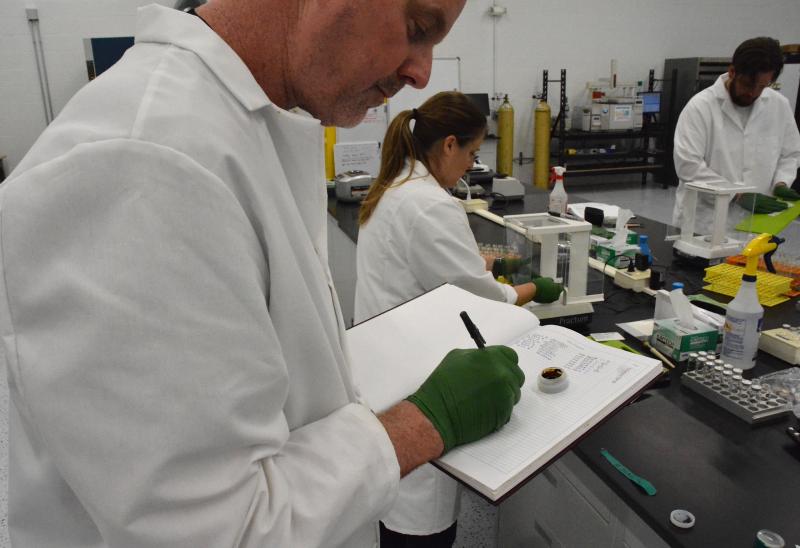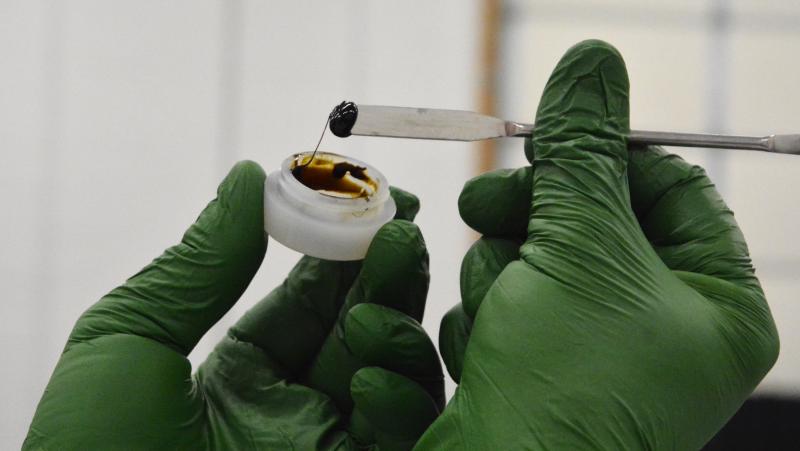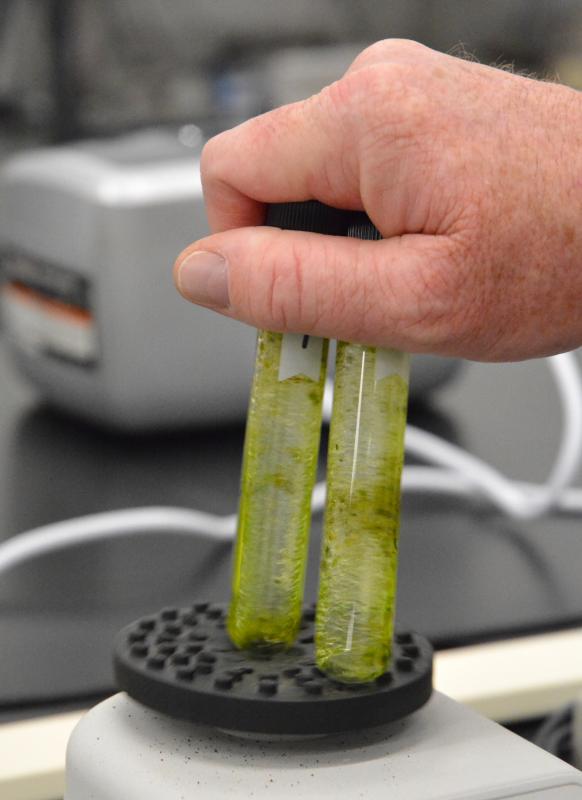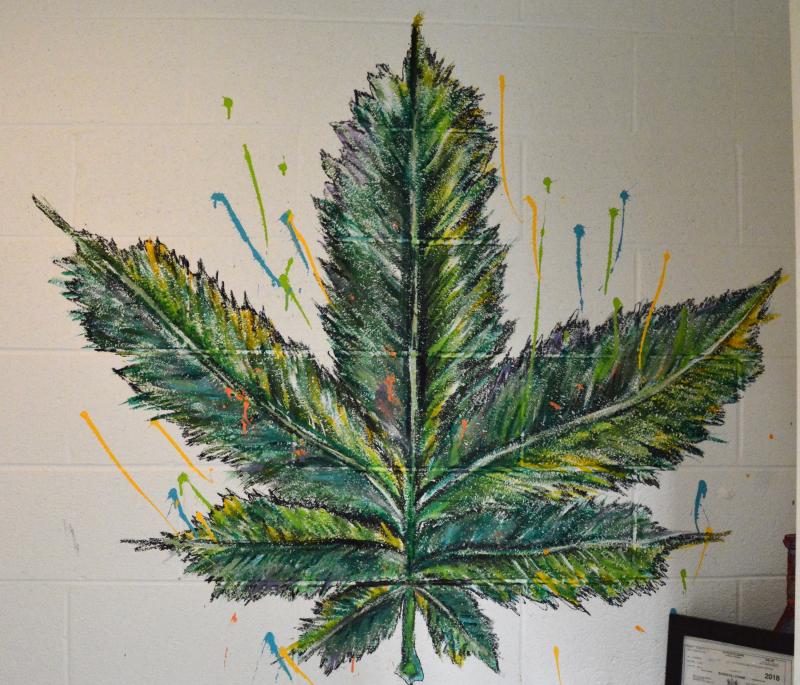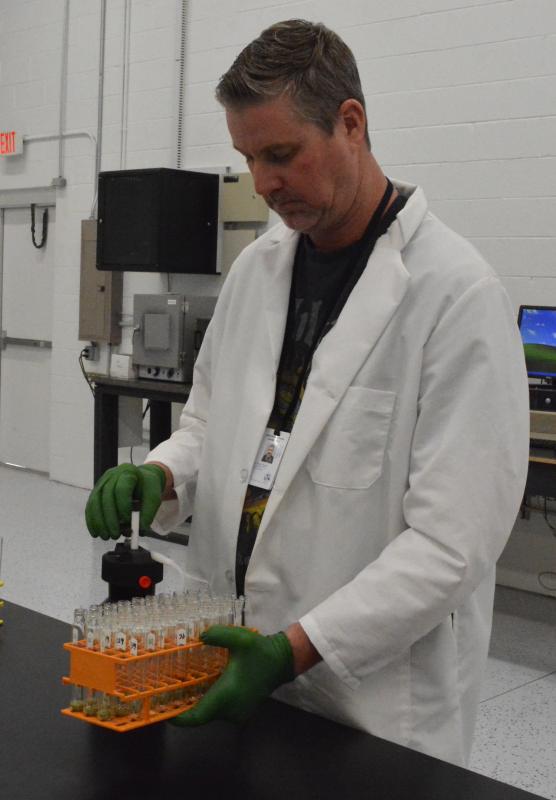Statewide testing keeps medical marijuana safe for users
Dan Woodall, High Tide Lab Company president and chemist, says testing medical marijuana is just like being a chemist for any other industry. But, he said, as the state’s contracted tester, he sometimes gets a sideways look when he tells people what he does.
“People do giggle,” said Woodall, during a recent tour of the lab in Camden. “But I’ve been a chemist for 20 years.”
Woodall was awarded the contract to be the state’s medical marijuana tester in November 2016. Three months later, under the name AgroLab Organics, the company began testing at a lab in Harrington.
“The first sample was taken Jan. 26, 2017, and we’ve been running them every week since,” he said.
The lab recently changed names and moved to Camden. It’s in an unmarked building, near the end of an industrial park. From the outside, the one telltale sign of what may be going on behind the locked garage doors is the high-tech lock on the entrance. Inside the front door, there’s a secured glass booth with a second lock. The lab has two cameras that allow the state to monitor every move of Woodall and his two lab technicians.
The lab is basically one big, open room. There’s a work table in the middle, where marijuana is prepared for sampling. Along the walls is high-tech, and expensive, testing equipment – gas chromatography, liquid chromatography and mass spectrometry – that allows the team to analyze the specific chemical makeup of each sample tested.
Woodall said the lab is testing for potency of different strains; terpenes – the aromatic oils that give cannabis its distinctive smell; the accuracy of labels from the state’s three growers; molds and mildews, bacteria, solvents and other potential hazardous chemicals that would be unsafe for patients with a compromised immune system. Pesticides are illegal to use in the production of medical marijuana in Delaware. For distillants, or concentrates, the lab is looking for too-high amounts of residual solvents that were used to extract the THC from the plant.
Woodall said the lab tests a representative sample from each batch of marijuana. For a 5-pound batch, the lab will test about 12 grams, he said. If a sample comes back with more than 400-colony forming units per gram, it’s designated as a failed sample.
When that happens, Woodall explained, they’ll go back to the grower and ask for two more samples from the same batch, and if they both pass, the failed sample is ignored. If one or both fail, the batch is deemed contaminated. A sample from a batch can fail, and two others pass, because contamination may come from a handler’s clothing or be on a container, Woodall said. These are known as false positives.
The lab also tests the concentrates, but generally speaking, Woodall said, bacteria are killed through the heating process to make them.
Woodall said the first year the lab tested approximately 1,500 samples, three of which failed. The second year, he said, there were 2,200 samples and 20 failed.
In addition to the three licensed growers in the state, Woodall said the lab occasionally tests CBD oil, which is legal in Delaware, for customers who want to make sure what they purchased is of good quality, and also they’ll test a patient’s homemade oils or edibles for potency.
Woodall said the methods used by High Tide were honed during his days in the pharmaceutical industry after graduating from Drexel University and then as a chemist and compliance officer for the state’s Department of Agriculture.
Woodall said he’s proud of the quality of the tests – most facilities across the country use only liquid chromatography – and the lab’s ability to turn sampling results around quickly – there’s a 2-day turnaround from receiving a grower’s batch and determining whether it’s passed or failed.
That said, he said, he’ll still get calls from the growers the morning results are due, and he has to tell them they’ll be ready in an hour.
Woodall said at this point, the lab has scaled up as the number of compassion centers, now at four, and patients grows. More than 3,700 people across the state are now compassion center patients. The lab isn’t close to reaching its testing limit, he said.
Looking to the future, Woodall said, if recreational use of marijuana is legalized in Delaware, he expects more testing for that. Also, he said, there’s an expectation that hemp farmers would have to have their crop tested, but those requirements are still being determined.
Pending medical marijuana legislation
There are two pieces of legislation that would amend the state’s medical marijuana program.
Senate Bill 24, introduced March 6, would give doctors the discretion to recommend medical cannabis to any patient the doctor believes will benefit from therapeutic use. This bill would also remove the requirement that only certain specialists may certify the use of medical cannabis for those under 18.
Senate Bill 59, introduced March 21, expands the pool of medical professionals who are eligible to recommend medical cannabis by permitting physician assistants and nurse practitioners to issue recommendations to their patients.
Both pieces of legislation have been assigned to the Senate Health and Social Services Committee.
Western U.S. company buys into state program
Arizona-based Harvest Health & Recreation announced April 10 that it had acquired companies in New Jersey, Pennsylvania, Maryland and Delaware. The facility purchased in Delaware was the Compassionate Care Research Institute, which opened in New Castle County earlier this year. According to a press release, Harvest now has 213 facilities in 17 states.
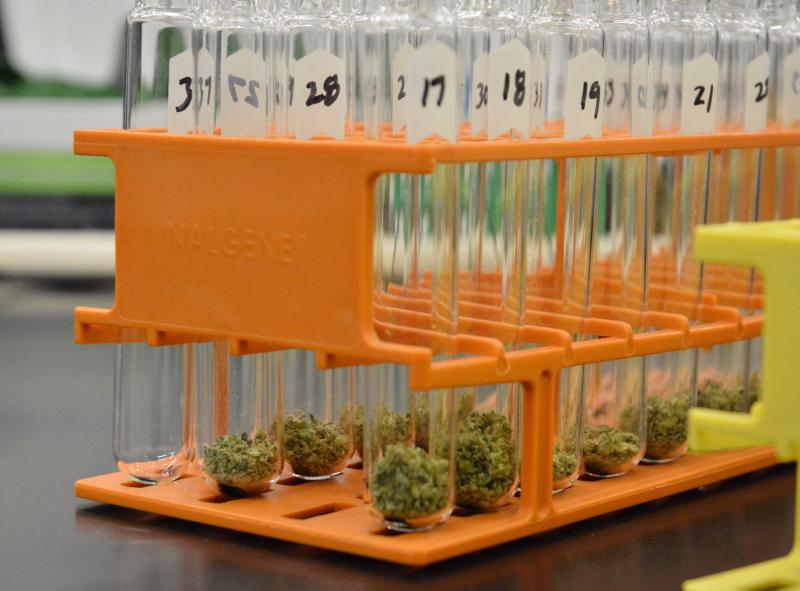

Chris Flood has been working for the Cape Gazette since early 2014. He currently covers Rehoboth Beach and Henlopen Acres, but has also covered Dewey Beach and the state government. He covers environmental stories, business stories and random stories on subjects he finds interesting, and he also writes a column called Choppin’ Wood that runs every other week. He’s a graduate of the University of Maine and the Landing School of Boat Building & Design.














